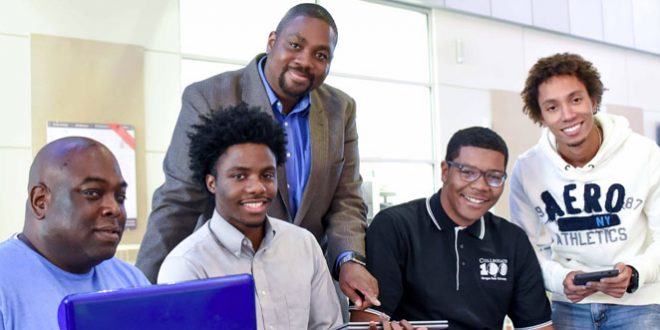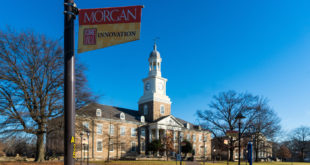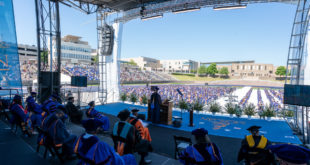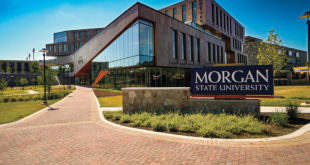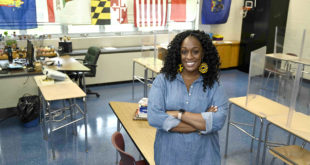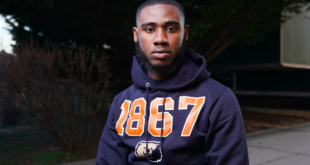If you’re a current college student looking for some assistance with money management or trying to avoid going into debt as a result of overspending, you will be happy to know: there’s an app for that. At least there is one now, after four enterprising Morgan students worked tirelessly for nearly 17 straight hours throughout the night to develop their idea and submit it to a panel of judges at the 2015 BE SMART Hackathon.
The hackathon, which was part of the inaugural Black Enterprise TechConneXt Summit held this October in Santa Clara, Calif., featured teams of students from five HBCUs competing against one another for best app development honors. The schools participating in the competition included Howard University, Johnson C. Smith University, Spelman College, Southern University, and Morgan.
The group of students from Morgan, calling themselves “Team Bear Squad,” consisted of four seniors: Benjamin “Ben” Hall, Myles Wright-Walker, Kevin Proctor and Khir Henderson. Hall, a U.S. Department of Homeland Security research scholar and the lone computer science major among the electrical engineering majors on the team, served as Team Bear Squad’s captain. Before making the trip to California, the team took advantage of an opportunity to formulate their ideas for the app they would develop.
Kofi Nyarko, D.Eng. associate professor and director of the Engineering Visualization Research Laboratory in Morgan’s Department of Electrical and Computer Engineering, helped familiarize the students with the competition rules. He also participated in the team selection process, along with Victor McCrary, Ph.D., Morgan’s vice president for research and economic development, and Timothy Akers, Ph.D., MSU’s assistant vice president for research innovation and advocacy.
“Coding backgrounds aside, this particular team was assembled because of the confidence we had in their ability to successfully represent this university on such a prominent stage, along with the stellar intangibles they brought to the competition,” said Dr. Nyarko. “This group of young men stood out as a result of their diligence, persistence, creativity and work ethic. We also believed that they put the university in the best possible position to win.”
Because the hackathon was sponsored by the giant financial firm Capital One, the only caveat was that whatever app concept the team came up with had to be financial in nature and be useful for budgeting, saving or making purchases on a mobile device. The team that developed the best or most useful app would be declared the winner of the hackathon and awarded a variety of prizes from Black Enterprise and other event sponsors.
“Going into the competition, we had a pretty good idea of what type of app we wanted to develop and what features it would have. All we needed to do by the time we got to California was build it,” said Ben Hall. “We also needed to give it a name.”
 Although the concept itself was a collaborative effort by the team, when it came to naming and branding the yet-to-be-developed app, the job was left up to the creativity of team member Myles Wright-Walker. After assessing how the completed app would work and would benefit the average college student, he came up with the perfect name: Oculus. In Latin, the word oculus means eye, and it is commonly defined as a window or an opening that has an oval or circular shape.
Although the concept itself was a collaborative effort by the team, when it came to naming and branding the yet-to-be-developed app, the job was left up to the creativity of team member Myles Wright-Walker. After assessing how the completed app would work and would benefit the average college student, he came up with the perfect name: Oculus. In Latin, the word oculus means eye, and it is commonly defined as a window or an opening that has an oval or circular shape.
“I came up with the name Oculus because we saw it as a ‘portal to your financial stability,’ a tool that provided monthly budget predictability and allowed the user to better forecast spending,” said Wright-Walker, who is quick to add, “It also was a very cool name for a mobile app.”
Each member of the team was responsible for separate pieces of the project and each member coded their own work. The end result was a functional financial services application whose features included spending alerts and a visual gauge that allowed users to know whether they were on target to achieve their desired budget goals for a given period. The app also has a social media element, as the team came up with an algorithm that would create a budget score (or “Oculus Score”) that increased, so long as the user stayed on budget. The score can be shared with others via social media.
“When we were developing this app, we took into strong consideration how millennials would adapt to using it, so we thought the social media component would be an important addition to the functionality,” said Proctor. “A positive Oculus Score could be positioned as an attractive enticement for commercial considerations, or something leveraged competitively between users.”
Along with the submissions from the other four teams, the Oculus was reviewed and evaluated by a team of judges that included executives from Capital One, The Giving Practice and the founder of Black Girls Code. According to the judges’ criteria, the winning app needed to have a social impact and be an innovative solution to a problem, and the finished product needed to be delivered on time. To meet the submission deadline, Team Bear Squad remained in the workspace provided by the event organizers and worked all night long, only stopping to get themselves prepared to present.
For their efforts, Team Bear Squad earned bragging rights over their fellow HBCUs and prize packages that included money and the opportunity to present their app to Capital One’s board. But their biggest reward, they say, was enjoying a great experience and receiving sage advice from some of the biggest names in the technology sector.
Another positive byproduct revealed by the experience is that their team had chemistry: something they hope will carry over to new team members next year.
When asked what the future holds for Team Bear Squad, Hall, their captain, replied, “That’s easy. We want to win more hackathons.”
Congratulations, Team Bear Squad!
 Morgan State University Newsroom Morgan State University
Morgan State University Newsroom Morgan State University
